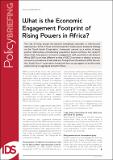| dc.contributor.author | Cirera, Xavier | |
| dc.contributor.author | Younis, Musab | |
| dc.date.accessioned | 2013-09-06T09:02:29Z | |
| dc.date.available | 2013-09-06T09:02:29Z | |
| dc.date.issued | 2013-09 | |
| dc.identifier.citation | Cirera, X. and Younis, M. (2013) 'What is the Economic Engagement Footprint of Rising Powers in Africa?', IDS Policy Briefing 41, Brighton: IDS | en_GB |
| dc.identifier.uri | https://opendocs.ids.ac.uk/opendocs/handle/20.500.12413/2951 | |
| dc.description.abstract | The role of rising powers has become increasingly important in international
development. Some of these countries base their development assistance strategy
on the ‘South–South Cooperation’ framework, centred on a notion of equal
partner relationships and extending cooperation beyond aid flows. Our research
shows that rising powers’ economic engagement with countries in sub-Saharan
Africa (SSA) is not that different to that of OECD countries in relation to sector
and country allocations of aid, trade and Foreign Direct Investment (FDI). As such,
the ‘South–South’ cooperation framework does not yet appear to be distinctive
when looking at aggregate economic flows. | en_GB |
| dc.description.sponsorship | DFID | en_GB |
| dc.language.iso | en | en_GB |
| dc.publisher | Institute of Development Studies (IDS) | en_GB |
| dc.relation.ispartofseries | Policy Brief;41 | |
| dc.rights.uri | http://creativecommons.org/licenses/by/3.0/ | en_GB |
| dc.subject | Rising Powers in International Development | en_GB |
| dc.title | What is the Economic Engagement Footprint of Rising Powers in Africa? | en_GB |
| dc.type | IDS Policy Briefing | en_GB |
| dc.rights.holder | Institute of Development Studies (IDS) | en_GB |
| dc.identifier.ag | OT/11009/5/1/1/138 | |
| dc.identifier.team | Globalisation | en_GB |


